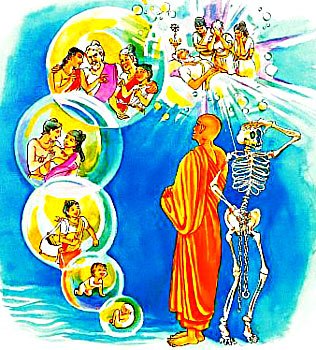 Consequence of actions was one of the chief postulates of Philosophy of Action according to Lord Buddha and it finds mention in the Dhammapada. He maintains that good and bad deeds fructify here. One cannot escape the results of his good or bad deeds. Sin brings in the suffering and pain. So an individual must take haste in meritorious deeds, as none can escape the consequences of actions done. Dhammapada states that one must hasten in performing meritorious deeds and he should restrain his mind from evil. If a man is slothful in performing good deeds, his mind gets inclined to evil. It has been emphasised that accumulation of good is indeed bliss.
Consequence of actions was one of the chief postulates of Philosophy of Action according to Lord Buddha and it finds mention in the Dhammapada. He maintains that good and bad deeds fructify here. One cannot escape the results of his good or bad deeds. Sin brings in the suffering and pain. So an individual must take haste in meritorious deeds, as none can escape the consequences of actions done. Dhammapada states that one must hasten in performing meritorious deeds and he should restrain his mind from evil. If a man is slothful in performing good deeds, his mind gets inclined to evil. It has been emphasised that accumulation of good is indeed bliss.
As per the Buddhist text the evil-doer grieves here in this world as well as after death when he sees the vileness of his own actions. On the contrary, the good-doer or the righteous man rejoices in this world and after death. He rejoices and becomes glad seeing the purity of his own actions. It has been said that such a man rejoices all the more when he reaches the state of bliss.
Dhammapada in this section has claimed that even a sinner sees happiness as long as his sin does not ripen but when the sin ripens then the sinner is able to realise the evil results of his sin. Similarly a good may see evil as long as his good deeds do not ripen but when the good deeds ripen then does the good man see the good results of his good deeds.
According to the philosophical tenets of Dhammapada there is no place on earth, neither in the sky nor in the depths of the ocean nor in the mountain caves where one may find refuge from the consequences of sinful act. No man can escape the consequence of his wrong deeds.
It says that fools with little knowledge are their worst enemies and they wander about in this world performing evil deeds which in turn bear bitter fruits. Dhammapada emphasises on the fact that no good deed will be followed by repentance, it is only evil action which is followed by repentance, weeping and tearful face. Only that is a good deed which is followed by delight and which has no repentance associated with it.
Dhammapada believes that it is best to leave an evil deed undone for after completing the act the evil doer repents. On the other hand it is better to perform good actions because it is not followed by any kind of repentance.
It has been said that a foolish person continues to perform evil deeds but gradually with time they realise the consequence of their action and suffer the bitter results. Rather it has been said that evil deeds of the transgressor brings him to an evil end.
Thus, this section of the Dhammapada has concluded saying that consequences of human actions are very important. One performs evil actions get bitter results and on the other hand one who performs good actions gets sweet results.









